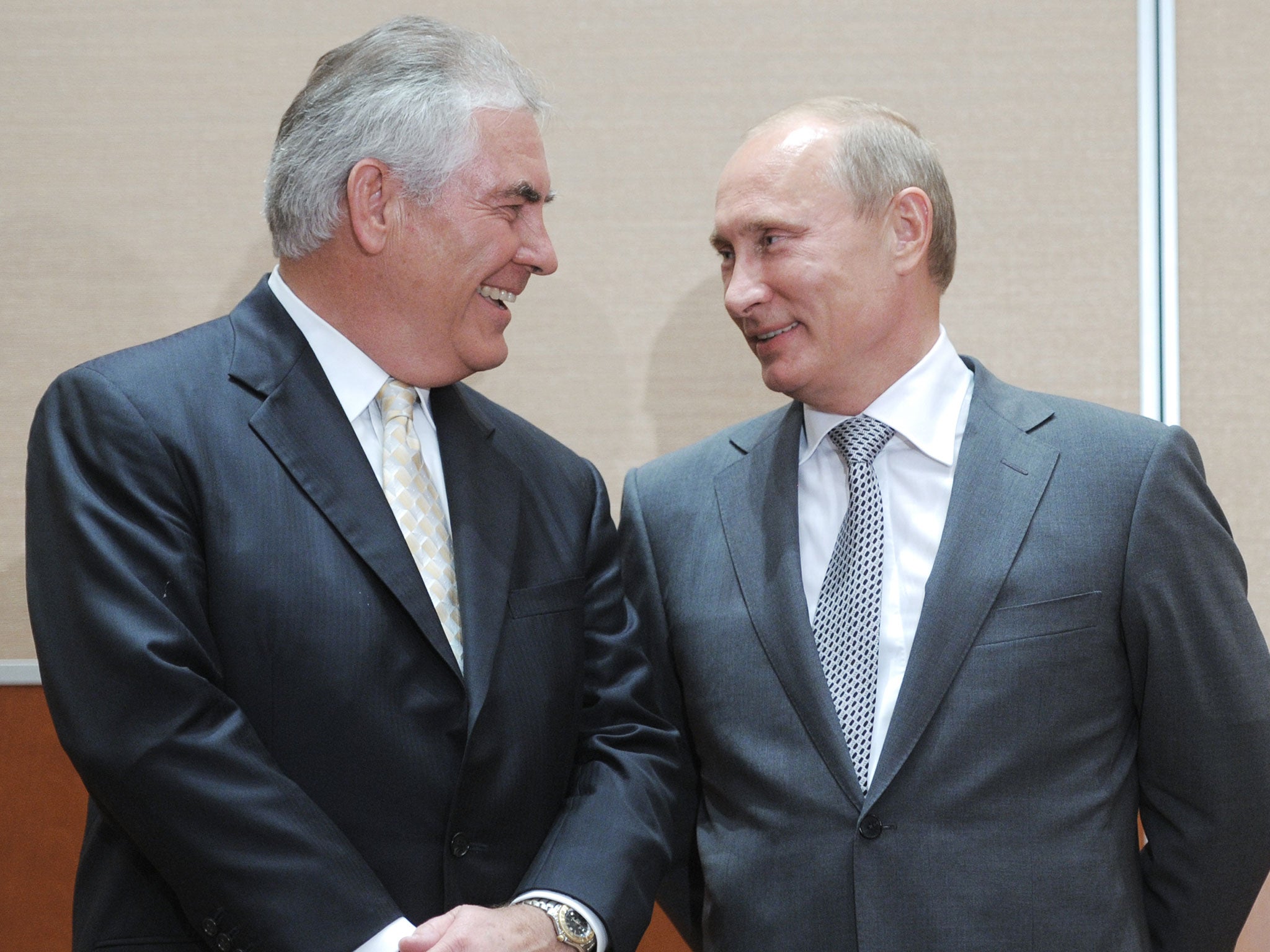Donald Trump administration's links with Russia in spotlight after Michael Flynn resignation
Russian politician dismisses resignation as product of 'Russphobia' and paranoia

Your support helps us to tell the story
From reproductive rights to climate change to Big Tech, The Independent is on the ground when the story is developing. Whether it's investigating the financials of Elon Musk's pro-Trump PAC or producing our latest documentary, 'The A Word', which shines a light on the American women fighting for reproductive rights, we know how important it is to parse out the facts from the messaging.
At such a critical moment in US history, we need reporters on the ground. Your donation allows us to keep sending journalists to speak to both sides of the story.
The Independent is trusted by Americans across the entire political spectrum. And unlike many other quality news outlets, we choose not to lock Americans out of our reporting and analysis with paywalls. We believe quality journalism should be available to everyone, paid for by those who can afford it.
Your support makes all the difference.The resignation of Donald Trump’s national security adviser has reignited debate about the US administration’s alleged links with Russia after revelations Michael Flynn misled the Vice President about the extent of his contacts.
Mr Flynn admitted giving Mike Pence and others “incomplete information” about phone conversations with the Russian ambassador “because of the fast pace of events” during the transition period.
The Vice President initially said the national security adviser had not discussed sanctions implemented against Russia over the Ukrainian war and alleged interference in the US election with Sergei Kislyak, but Mr Flynn later conceded the issue may have come up.
Dmitry Peskov, a spokesperson for the Kremlin, confirmed the phone calls took place in December but denied he and Mr Kislyak had discussed easing sanctions.
Any assurances offered over the incoming administration’s new approach would breach diplomatic protocol and constitute a possible violation the Logan Act, which aims at keeping citizens from conducting diplomacy.
The Justice Department – under dismissed acting Attorney General Sally Yates - had reportedly warned the White House over the conversations last month, arguing that they could leave Mr Flynn vulnerable to blackmail.
His eventual departure on Monday evening came after the White House issued a statement saying Mr Trump was “evaluating the situation” over his adviser, who was previously dismissed by Barack Obama as head of the Defence Intelligence Agency in 2014.
The following year, Mr Flynn was paid to attend a gala dinner for state-owned broadcaster, and sat next to Vladimir Putin during the event.
Mr Flynn was one of several presidential appointments hailed by pro-Kremlin analyst Sergei Markov as a “fantastic team”, alongside Rex Tillerson.
Mr Tillerson, the Secretary of State, has had business ties in Russia for two decades as head of the Exxon Mobil oil and gas corporation and its join Russian venture Exxon Neftegas.

He has met the Russian President several times during the course of his business dealings, being bestowed with the Order of Friendship by Mr Putin in 2013, and was also linked with sanctioned Rosneft head Igor Sechin.
In an Exxon shareholder meeting in May 2014, Mr Tillerson said the anti-Russian sanctions putting millions of dollars in his firm at risk were not found to be “effective”.
He said he never lobbied against the sanctions during his confirmation hearing, where he was grilled on Russia’s record on human rights and intervention in Syria, telling Democrats that he would not “use the term [war criminal]” to describe Mr Putin.
When confronted by claims that Mr Putin was a “killer” in a Fox News interview, Mr Trump replied: “There are a lot of killers, we've got a lot of killers. What do you think? Our country's so innocent?”
The US President has reiterated his “respect” for his Russian counterpart, who complimented him during his presidential campaign.
Mr Trump also dismissed the FBI’s allegations that Russian hackers had interfered in his election, sparking a row with his own security agencies, and praised Mr Putin’s “very smart” decision not to immediately impose counter-sanctions in December.
He has denied having any financial links with Russia himself, tweeting last month: "Russia has never tried to use leverage over me. I have nothing to do with Russia - no deals, no loans, no nothing."
A Trump hotel was proposed in Moscow in the 2000s but never built, while the President visited Moscow in 2013 to host the Miss Universe pageant.
Mr Trump's alleged activities during his stay were included in a dossier passed to the FBI, but could not be verified.
Shinzo Abe, the Prime Minister, said Mr Trump had “agreed” with Japan’s promotion of dialogue with Russia over territorial issues, as well as the Syrian and Ukrainian wars during his recent visit to the US.
The friendly overtures caused unease in Washington that has been worsened by Mr Flynn’s departure.
But Konstantin Kosachev, the chairman of the Russian State Duma’s foreign affairs committee, said the national security adviser’s removal represented “not just paranoia but something even worse.”
“Either Trump hasn't found the necessary independence and he's been driven into a corner...or Russophobia has infected the new administration from top to bottom,” he wrote in a Facebook post.
His counterpart in the lower chamber of the Russian parliament, senator Alexei Pushkov, tweeted shortly after the announcement that ”it was not Flynn who was targeted but relations with Russia”.
Mr Peskov, Mr Putin’s spokesperson, declined to comment further on Tuesday morning. “This is the internal affair of the Americans, the internal affair of the Trump administration,” he said. “It's nothing to do with us.”
Join our commenting forum
Join thought-provoking conversations, follow other Independent readers and see their replies
Comments